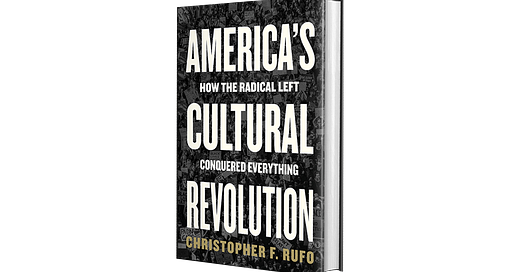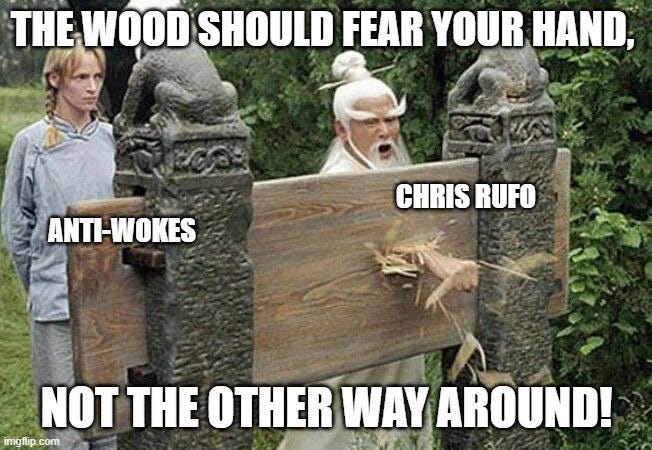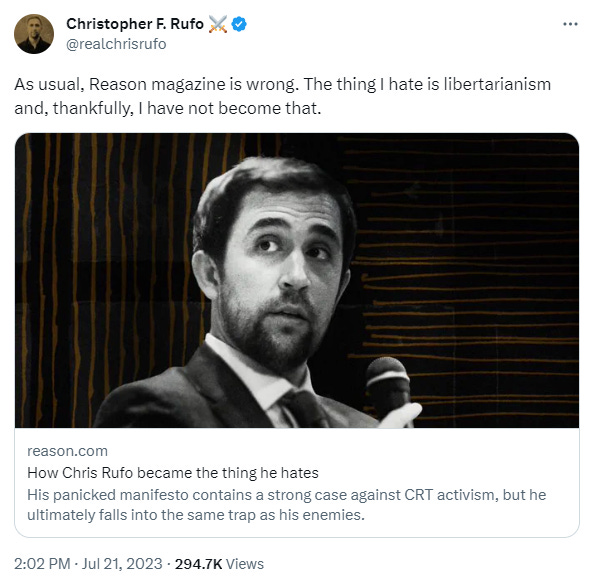
Compared to his social media, Chris Rufo’s best-selling America’s Cultural Revolution is surprisingly coy. Under questioning, he opened up. Here are my chief thoughts:
Chris has a much more sympathetic view of Herbert Marcuse, Angela Davis, Paolo Freire, Derrick Bell, and the critical theorists generally than I do. I see these figures and their whole intellectual tradition (narrowly, the Frankfurt School; broadly, Continental philosophy) as intellectually fraudulent. Chris decidedly disagrees. He values their search for truth, admires their idealism, and actually expresses pity for their disappointment with the real world.
In hindsight, I shouldn’t have been surprised. After all, Rufo told Hanania:
I spent a lot of time with these four people, reading everything from their main works to their articles and interviews and correspondence and notebooks, these huge volume sets, or actually going into the archives at their collected papers and seeing what they were doing. And I actually came away with this kind of, not even a grudging respect, but a kind of respect of mutual recognition at least as far as my own interpretation, feeding back and engaging with their work. It felt as if I gained a deeper understanding of these people and the reason why I spent so much time in the book kind of telling their story, a bit weaving in their biography, is that ultimately these are people I think all of whom were idealists at one point in their lives. And for me, their stories are the story of the modern left, or maybe the perpetual story of the left is idealism and disillusion. And so I understood why they believed what they believed. I grew to respect them even as intellectuals.
Why do I deem the critical theorists intellectually fraudulent? Simple: Actual intellectuals construct arguments capable of convincing their critics, or at least the undecided. Which in turn means (a) starting with common-sense premises that seem obvious to people who don’t share your worldview, and (b) carefully reasoning from these obvious premises to not-so-obvious conclusions. In contrast, pseudo-intellectuals like Marcuse, Davis, Freire, and Bell primarily preach to the choir and appeal to emotion.
If you watch the interview, Chris seems to grant my accusation that Marcuse just “preaches to the choir,” and can’t produce any example of a Marcusean argument that even tries to convince unbelievers. Perhaps committed Marcuseans could better meet my challenge, but can you imagine Marcuse agreeing to a bet?! To me, this package is damning evidence of intellectual fraud, but Chris still stands up for Marcuse’s merits as a thinker.
I understand where Chris is coming from: He’s clearly read a giant stack of critical theory, and frowns on his ignorant allies who dismiss thinkers they’ve never read. Fair enough, but I must protest: After reading some thousands of pages of Continental philosophy, I still dismiss the whole tradition.* Enough is enough. Though the sheer word-count of Continental writing staggers the imagination, this work is vacuous rambling that boils down to a pile of Orwellian doublethink. While I grant that a specific Continental thinker might have something insightful to say about something, this is despite their corrupt approach to ideas, not because of it.
Not only does Chris overrate the intellectual quality of the stars of critical theory; he fails to see what moral monsters they were. How so? The critical theorists start with an intellectually negligent intellectual method, short on actual arguments but long on emotion. They reach murderous, totalitarian conclusions; Marcuse, Davis, and Freire were outright communists. After reaching these absurd conclusions, they refuse to reexamine their starting point. If and when they visited their Marxist “utopias,” they remain undeterred. They were, in short, fanatics.
Since the conscientious pursuit of truth is virtuous, fanaticism is the ultimate intellectual vice. Being a fanatic is the intellectual equivalent of firing a gun into a random crowd and hoping you shoot Hitler. Due to your negligent selection process, you almost almost end up in severe error. And even if you do miraculously hit the truth, your method was still reckless.
Fanaticism is especially vicious if you’re a professional intellectual. When ideas are your career, keeping your emotions under control and second-guessing your conclusions is your job. And the greater the intellectual’s intelligence, the more culpable irrationality becomes.
Chris protests that the American Founding Fathers were “fanatics,” too. Maybe a few, but not most. Unlike, say, The Communist Manifesto, The Federalist Papers (and The Anti-Federalist Papers) don’t just emote all over their critics. They actually try to start with common sense and construct arguments to persuade people who don’t already agree with them. I say this despite my long-standing opposition to the American Revolution. The American revolutionaries erred, but I’ll still give them a B for intellectual effort.
If I correctly grasp Chris’ position, his big problem with Marxism is just that its grossly mistaken view of human nature leads to total disaster. In a sense, he’s right. The reason we’re still talking about the evil of Marxism is the ~100M body count. But the fanaticism was what got the Marxists to not only launch mass murder, but persist in their murderous ways. The rank-and-file fanatics were evil, the intellectual fanatics were worse, and the admittedly high-IQ intellectuals at the top were about as evil as humans get.
I was only mildly surprised that Chris strongly disavowed the “By any means necessary” slogan. While he enjoys playing l’enfant terrible on Twitter, his actual policy proposals are consistently moderate. Take education. His top goals are to (a) take wokeness out of the public school curriculum, and (b) get school choice. “Public schools shouldn’t impose extreme left-wing dogma on the whole student body” and “Fund students not systems”: hardly a well-crafted plan to create a right-wing monoculture.
I have spent over a year telling libertarians to appreciate Chris Rufo. I even made him this meme of gratitude:
After I scheduled my interview with Chris, he tweeted this:
I was unhappy, for many reasons. On the most personal level, I’m a libertarian, and I want to be friends with Chris. I definitely don’t want him to hate me. Furthermore, most of my friends are libertarians, and I don’t want anyone to hate them, either. On a more substantive level, I say that libertarians should support at least 80% of what Chris is trying to accomplish in the real world. Petty infighting is a classic libertarian vice; Chris’ anti-libertarian tweet is another sign that despite his denials, he’s one of us. I’m only half-joking.
I end the interview by bringing up this Twitter unpleasantness. For what it’s worth, Chris backpedaled quite a bit. Was he just humoring me? You decide. Either way, I’m still glad I interviewed Chris, and I’m grateful that he’s making higher ed less awful. All of my closest friends have said much crazier things than “I hate libertarianism.” And as I’ve said before, I don’t judge people by the worst thing they’ve said. I just them by their track records. By my count, Chris’ track record is very good indeed.
Quite a few people are puzzled by my affection for Chris. But it’s not so puzzling. I obviously don’t agree with everything he says or does, but I agree with at least 80% of it. Probably more like 90%. Though millions of people complain about wokeness, Chris is one of the few people successfully doing anything about it. If his many fanatical critics were right to call Chris a “fascist,” I would be anti-Chris. As usual, however, the fanatics are mired in error. Indeed, since one of my main criticisms of Chris is that he’s too forgiving of the Founding Parents of Wokeness, I suspect his fanatical detractors would say I’m a bigger fascist than he is.
P.S. I didn’t have time to ask Chris the following questions. I wonder what he would have said? Chris, if you’re reading this, consider this a standing invitation to write a guest post in response…
The obvious question for Angela Davis and Derrick Bell: If you could succeed in racist America, why can’t everyone? What would they say? What’s the truth?
I say that “systemic” is the word that makes “racism” a tautological accusation. A normal racist story about high black incarceration rates, for example, is that blacks get punished more for the same crime. “Systemic racism” is what you say when faced with ironclad evidence that higher black crime rates fully account for higher black incarceration rates. Am I being fair?
Who’s the Marcuse of feminism? Of gender ideology?
What was worse in practice: McCarthyism or DEI?
You’ve made a lot of right-wing enemies. Probably the most common accusation is that you want to use government to replace our left-wing monoculture with a right-wing monoculture. Is there any truth to this?
* There are a few borderline cases: Kant, most notably, has one foot in real Anglo-American philosophy and one foot in fake Continental philosophy. He’s not a fountain of wisdom, but neither is he a waste of words like Hegel or Marx or Marcuse.



















Thank you for writing this!
-The obvious question for Angela Davis and Derrick Bell: If you could succeed in racist America, why can’t everyone? What would they say? What’s the truth?
I address this in the chapter on Bell, showing that his own parents modeled the behavior and values that allowed for his success, which he then foolishly denounced in favor of a cynical ideology.
-I say that “systemic” is the word that makes “racism” a tautological accusation. A normal racist story about high black incarceration rates, for example, is that blacks get punished more for the same crime. “Systemic racism” is what you say when faced with ironclad evidence that higher black crime rates fully account for higher black incarceration rates. Am I being fair?
The phrase "systemic racism" is a mirage—it's unfalsifiable and unmeasurable. It's a persuasive rhetorical device that, at heart, seeks to explain group disparities in outcomes, many of which are caused by group disparities in behavior, as evidence of racism.
-Who’s the Marcuse of feminism? Of gender ideology?
Foucault. All of gender theory and queer theory finds its foundation in Foucault, who turned Nietzsche into a tool for the Left on sexuality.
-What was worse in practice: McCarthyism or DEI?
DEI, by far. McCarthyism was mild and benign by comparison.
-You’ve made a lot of right-wing enemies. Probably the most common accusation is that you want to use government to replace our left-wing monoculture with a right-wing monoculture. Is there any truth to this?
There is not. My goal is to have public institutions that reflect the values of the public. In blue states, this will be oriented to the Left. In red states, this will be oriented to the Right. I want to see more balance, which will require some political intervention. A healthy republic will have a variety of views competing in the public debate. We don't have that now. That's why I'm working to change it.
A few thoughts:
- Rufo’s approach to running the Florida college seems to contradict the ideas he purports to espouse. “We only hire people who buy into the classical liberal tradition.” So, you only hire people that subscribe to a specific way of viewing the world? You avoid hiring people in entire fields of study that come to conclusions you disagree with? In my view the optimal approach if one truly believes in classical liberalism is to build an institution that is committed to intellectual freedom (and will not cancel, hound out, etc.) professors for their views. It seems to me that Rufo is just building a counterpoint institution that is firmly settled on one side of a contemporary debate, rather than one that truly protects free inquiry, vibrant / friction-heavy intellectual life. Why not take a more UofCesque approach? I suspect Caplan only accepts this silly activism because he finds its opposite worrisome.
- Caplan believes that these thinkers are “evil”, Rufo doesn’t grant this. Clearly just a difference in definition of terms. Rufo is thinking on the personal/ interpersonal level, Caplan is thinking on the consequential level. The former is more typical of how the average person defines evil, and I’m inclined to a descriptivist model.
- The idea that these thinkers are intellectually-fraudulent is too easy. They’ve convinced far more people to adopt their views than Caplan or any one of us commenters has. Why is that? Maybe they’re sophists, but what do you call a sophist who actually believes her ideas? Maybe someone who’s making a good faith, if flawed argument…and one that many people have found compelling over the past half-century!